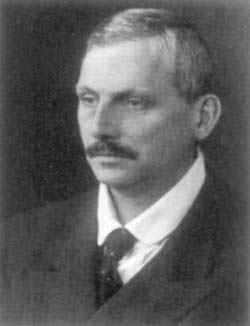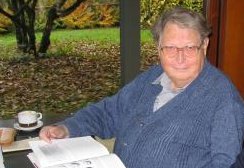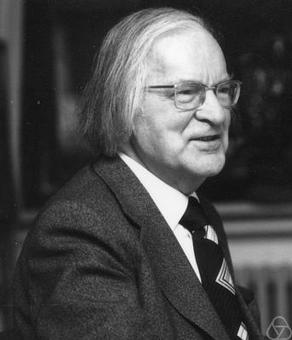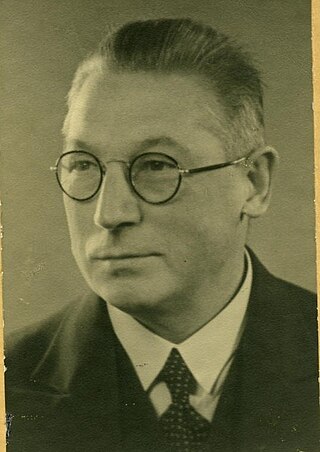
Reinhard Siegmund-Schultze (born 2 April 1953 in Halle (Saale)) is a German historian of mathematics.

Reinhard Siegmund-Schultze (born 2 April 1953 in Halle (Saale)) is a German historian of mathematics.
Siegmund-Schultze studied mathematics at the Martin Luther University Halle-Wittenberg, where he received his doctorate in 1979 on the history of functional analysis. [1] He wrote his doctoral thesis between 1975 and 1978 during research studies at the Karl-Sudhoff-Institut für Geschichte der Medizin und der Naturwissenschaften (Karl Sudhoff Institute for the History of Medicine and Natural Sciences) at the Leipzig University. He then worked until 1990 as an assistant at the Humboldt University of Berlin, where he completed his habilitation in 1987 ("Contributions to the analysis of the development conditions of mathematics in fascist Germany with special consideration of the presentation system"). [2] [3] From 1991 to 1994 he was a Feodor Lynen research fellow at the Alexander von Humboldt Foundation in the USA. Since 2000 he has been a professor of history of science at the University of Agder in Kristiansand, Norway. [2]
Siegmund-Schultze is known for historical work on the unfortunate circumstances and emigration of mathematicians from National Socialist Germany. [4] [5] [6] In particular, he has written extensively about Richard von Mises. [7] [8] [9] [10] [11] [12] [13] [14]
Since 2000 he has been a member of the Académie Internationale d'Histoire des Sciences headquartered in Paris. [2] In 2011 he gave the historical lecture Landau und Schur: eine Freundschaft in unmenschlicher Zeit (Landau and Schur: a friendship in inhumane times), which was part of the events accompanying the Euler Lecture. [15] In 2014 at the ICM in Seoul, he was an invited speaker with talk One hundred years after the Great War (1914–2014): A century of breakdowns, resumptions and fundamental changes in international mathematical communication. [16] Since 2016 he has been co-editor of Historia Mathematica . [2]
{{cite book}}: CS1 maint: postscript (link); Mathematical reporting in Hitler's Germany: the demise of the Jahrbuch über die Fortschritte der Mathematik (Yearbook on the Progress of Mathematics)
Abraham Fraenkel was a German-born Israeli mathematician. He was an early Zionist and the first Dean of Mathematics at the Hebrew University of Jerusalem. He is known for his contributions to axiomatic set theory, especially his additions to Ernst Zermelo's axioms, which resulted in the Zermelo–Fraenkel set theory.

Issai Schur was a Russian mathematician who worked in Germany for most of his life. He studied at the University of Berlin. He obtained his doctorate in 1901, became lecturer in 1903 and, after a stay at the University of Bonn, professor in 1919.

Helmut Hasse was a German mathematician working in algebraic number theory, known for fundamental contributions to class field theory, the application of p-adic numbers to local class field theory and diophantine geometry, and to local zeta functions.

Richard Martin Edler von Mises was an Austrian scientist and mathematician who worked on solid mechanics, fluid mechanics, aerodynamics, aeronautics, statistics and probability theory. He held the position of Gordon McKay Professor of Aerodynamics and Applied Mathematics at Harvard University. He described his work in his own words shortly before his death as:
practical analysis, integral and differential equations, mechanics, hydrodynamics and aerodynamics, constructive geometry, probability calculus, statistics and philosophy.
Hans Adolph Rademacher was a German-born American mathematician, known for work in mathematical analysis and number theory.

Felix Bernstein, was a German Jewish mathematician known for proving in 1896 the Schröder–Bernstein theorem, a central result in set theory, and less well known for demonstrating in 1924 the correct blood group inheritance pattern of multiple alleles at one locus through statistical analysis.
Gesellschaft für Angewandte Mathematik und Mechanik, often referred to by the acronym GAMM, is a German society for the promotion of science, founded in 1922 by the physicist Ludwig Prandtl and the mathematician Richard von Mises. The society awards the Richard von Mises prize annually. The society publishes the journal GAMM-Mitteilungen and Zeitschrift für Angewandte Mathematik und Mechanik through Wiley.

Robert Erich Remak was a German mathematician. He is chiefly remembered for his work in group theory. His other interests included algebraic number theory, mathematical economics and geometry of numbers. Robert Remak was the son of the neurologist Ernst Julius Remak and the grandson of the embryologist Robert Remak. He was murdered in the Holocaust.
The German Mathematical Society is the main professional society of German mathematicians and represents German mathematics within the European Mathematical Society (EMS) and the International Mathematical Union (IMU). It was founded in 1890 in Bremen with the set theorist Georg Cantor as first president. Founding members included Georg Cantor, Felix Klein, Walther von Dyck, David Hilbert, Hermann Minkowski, Carl Runge, Rudolf Sturm, Hermann Schubert, and Heinrich Weber.

Emil Hilb was a German-Jewish mathematician who worked in the fields of special functions, differential equations, and difference equations. He was one of the authors of the Enzyklopädie der mathematischen Wissenschaften, contributing on the topics of trigonometric series and differential equations. He wrote a book on Lamé functions.
Reinhold Strassmann was a German mathematician who proved Strassmann's theorem. His Ph.D. advisor at University of Marburg was Kurt Hensel.

Helmut Grunsky was a German mathematician who worked in complex analysis and geometric function theory. He introduced Grunsky's theorem and the Grunsky inequalities.

Hans-Ludwig Wußing was a German historian of mathematics and science.

Richard Baldus was a German mathematician, specializing in geometry.

Hans Rohrbach was a German mathematician. He worked both as an algebraist and a number theorist and later worked as cryptanalyst at Pers Z S, the German Foreign Office cipher bureau, during World War II. He was latterly known as the person who broke the American diplomatic O-2 cypher, a variant of the M-138-A strip cipher during 1943. Rohrbach wrote a report on the breaking of the strip cypher when he was captured by TICOM, the allied effort to roundup and seize captured German intelligence people and material.

Renate A. Tobies is a German mathematician and historian of mathematics known for her biographies of Felix Klein and Iris Runge.
Erhard Scholz is a German historian of mathematics with interests in the history of mathematics in the 19th and 20th centuries, historical perspective on the philosophy of mathematics and science, and Hermann Weyl's geometrical methods applied to gravitational theory.

Rudolf Ernst Rothe was a German applied mathematician.
Hans Lorenz was a German engineer and mathematical physicist. He was an influential professor at the University of Göttingen and at Danzig where he was involved in establishing the training of engineers with sound mathematical and physics foundations.
Walter Purkert is a German mathematician and historian of mathematics.